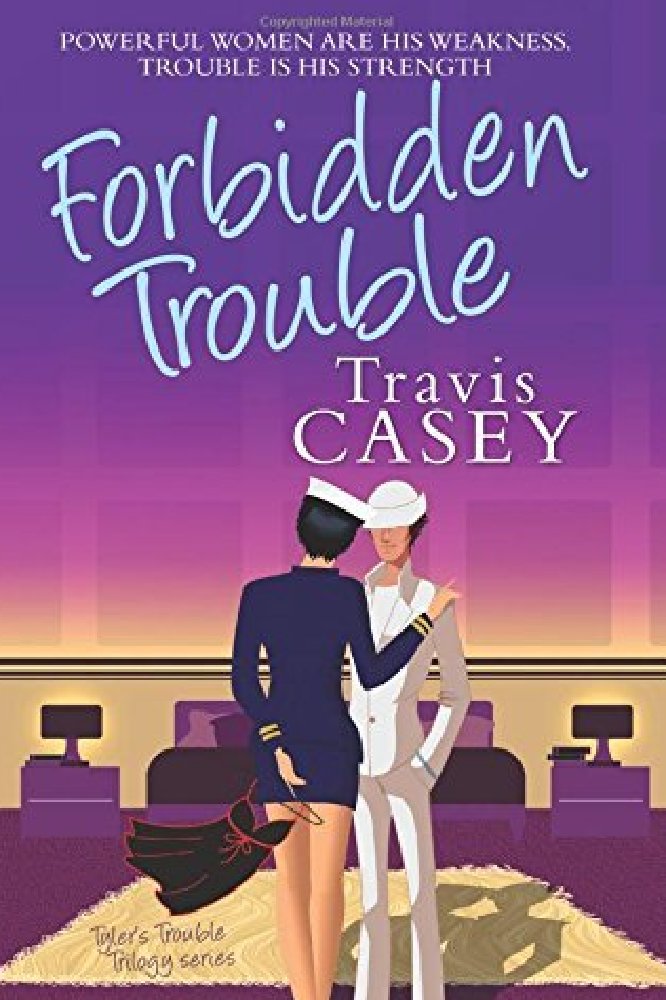
Forbidden Trouble
The writing world is still a sexist industry. That's not anyone's fault, it's just not possible to change people's personal preferences and tastes. Some women have told me they would never read a romance written by a man. And I would be unlikely to read a book regarding submarine warfare written by Betty Juggs. That's not being sexist, just a preference. However, it can be refreshing to get a different perspective in a classic genre. I do my best to tailor my writing for a female audience and have gone through a huge learning curve. Here are ten things I've learned or adapted as a guy writing romance.
I have worked with women writers in various critiquing groups and there are different standards for male and female romance writers. For that very reason, my number one tip for a guy writing romance is to get female feedback prior to publication. I have innocently used terms and phrases that sound natural to me, yet discovered many women hate certain terms and words. I do my best to avoid such wordage, but still have an obligation to my character to speak naturally.
Men are visually driven creatures. So when I write a bedroom scene, my character wants to focus on the beauty of her nakedness in exacting detail. However, the female character and the reader wants to know if he'll still respect her in the morning. Having female critiquing partners helps me find the right balance.
When a woman writes a sex scene, it's hot. When a guy writes a sex scene, he's a perv. For a guy, sex tends to be a physical act. For a woman it's an emotional one. Writing from a male point of view (POV) it's impossible to remove the physical side of it otherwise it sounds like a woman trying to write like a guy – or the guy sounds totally gay and has no place in the sex scene anyway. I have trained myself to incorporate more emotions from the fella and get him to acknowledge his feelings in front of the reader.
The difference between erotica and porn: If you take the sex out of erotica, there is still a story to be had. If there is no story without the sex, it's porn.
In a conventional romance the hero is only seen (shown) to have sex with one person, the heroine. Other relationships or liaisons may be eluded to, but must be kept somewhat vague and non-graphic in nature.
A romance is two people falling in love. The circumstances may be complicated, but the basic premise is simple.
Be original. There are far too many writers jumping on popular bandwagons trying for copycat fame. Fifty Shades broke new boundaries, but instead of following the trend already set, try to set the next trend.
Writing romantic comedies takes a lot of pressure off. Using humour builds in a certain amount of forgiveness and saves the temptation of competing with the Jackie Collins' or Jane Austens of the writing world.
Character flaws, physical as well as emotional, adds realism. It doesn't need to be big – a small scar, a nervous habit (hair twirling), or something that shows them slightly less than perfect makes them more relatable.
One has to get over the Mommy and Wifey factor. Writing stirs a creative vein and often things flow from where we do not know. You have to go with it unsuppressed. It can be difficult when the wife presses you, "Where did you get that idea from?" It honestly does often come from the subconscious. Don't fight it. Write whatever comes to mind. That's what first drafts are for. Edits will cut the things that you really don't want to have to explain.
My favorite question I was asked during an interview was:
What is the best thing about being a romance writer?
I can control what a woman thinks, says, and does.
Not many guys can say that.
Forbidden Trouble by Travis Casey (published by CreateSpace RRP £10.99 paperback, RRP £1.99 ebook) and is available to purchase from online retailers and to order from all good bookstores. For more information please visit, traviscasey.com

